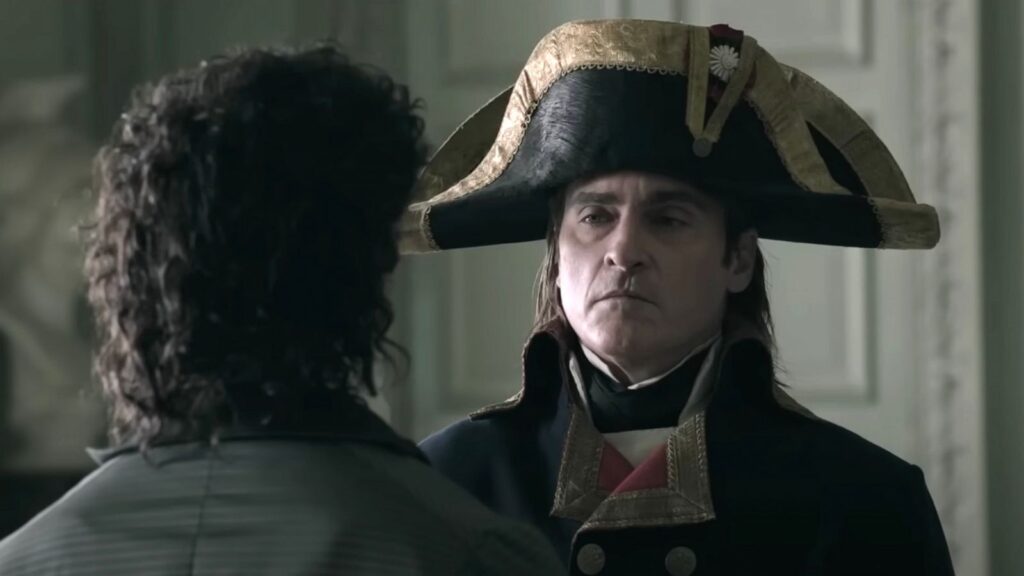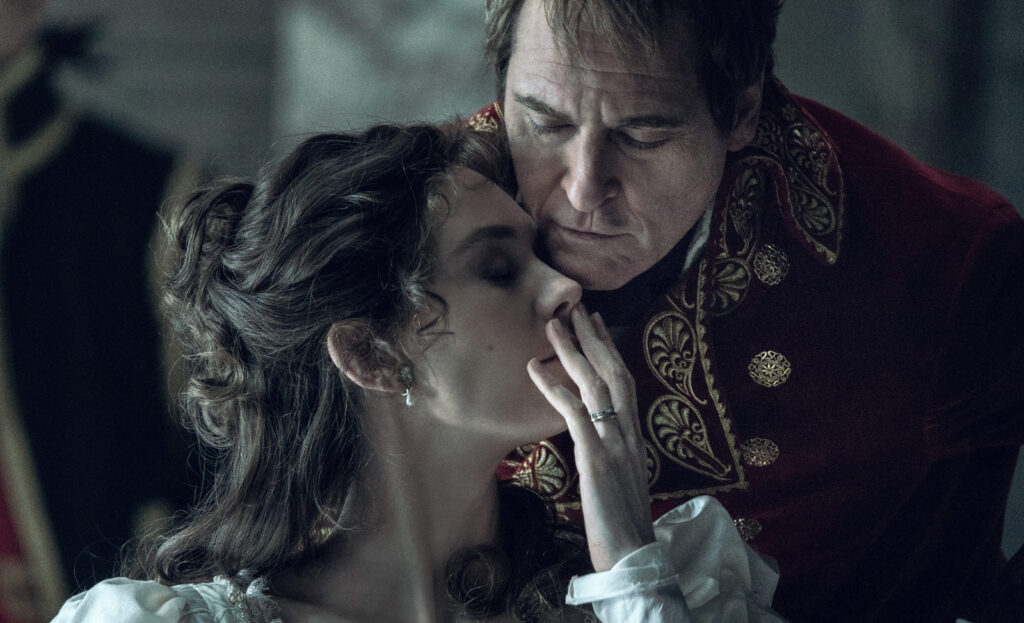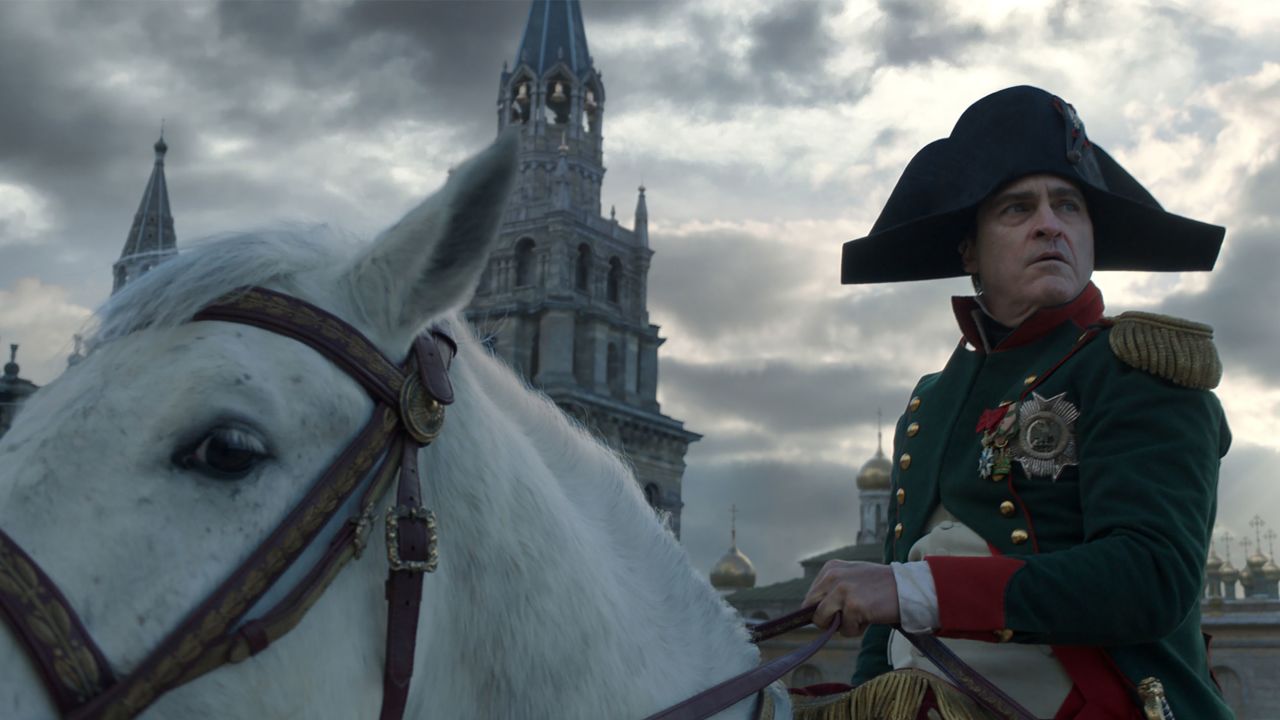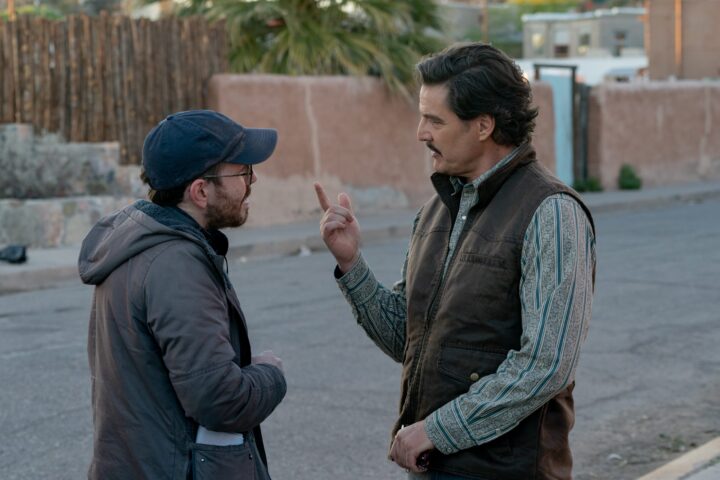Ridley Scott’s Napoleon, starring Joaquin Phoenix as the legendary Corsican-born general who reigned as French emperor for a decade, does little to illuminate the man or the leader. Scott’s 158-minute historical saga, a surprisingly tedious grind from an indisputably master director and world-class actor, is a curiously rudimentary assembly of facts failing to elucidate Napoleon’s brilliant calculations as a military strategist, turbulent relationship with Empress Josephine or vaunted battlefield victories. And a big part of the problem is Phoenix’s dull performance.
The picture opens in the late 1700s with a terrifically realized Marie Antoinette guillotine death, after which twenty-five-year-old (a stretch as Phoenix never looks less than 50) Napoleon Bonaparte rises through the military ranks during the French Revolutionary Wars. While the story tells us he had drive and grit it’s hard to see it in Phoenix’s portrait, yet after a successful 1793 performance in the Siege of Toulon (good use of CGI ships) his star rises to general.
Things continue looking up when Napoleon meets Josephine de Beauharnais (Vanessa Kirby) at a drunken bash and strikes an instant connection. For her part, single mother Josephine has been paroled from a prison stint following the Reign of Terror execution of her husband, politician and general Alexandre de Beauharnais. The picture does capably in these stretches, introducing army officer and confidante Paul Barras (Tahar Rahim) and charting the overthrow of Maximilien Robespierre (Sam Troughton).

While Napoleon and Josephine are presented as soul mates, Phoenix’s monotone delivery suggests anything but romantic possession, which Napoleon finds challenging to maintain while in Egypt with his troops, the gossip mill revealing that Josephine has taken lover. He effectively deserts his soldiers to return home, promptly tossing Josephine from the castle to little avail, each party agreeing one is “nothing” without the other.
To make a film about one of world history’s largest legends and have it feel so small is no mean feat, but one that Scott and Phoenix have accomplished, flip flopping between domestic squabbles with Josephine and arena of war theatrics that carry little heft. Despite a grandiosity in sets and a few well-composed tableaus (candelabras are on point), the picture has little to say and almost no dramatic weight.
While six of Napoleon’s 66 battles are depicted here—including Toulon, Marengo, Austerlitz and Waterloo (where a welcome Rupert Everett classes the picture as the Duke of Wellington)—with the exception of an impressive sequence involving Austerlitz’s famed, frozen lake entrapment, the Napoleonic Wars largely whiz by with little distinction. At one juncture upon Napoleon’s return to France the picture demonstrates the trust between Napoleon and his former soldiers, but the movie does not fortify this notion by showing any bonds built in battle.
As “The Little Corporal,” Phoenix is jarringly contemporary and drolly detached, which might be acceptable if the film had anything modern to say about Napoleon’s military accomplishments, to which it gives little consideration. Nor does it regard the pitfalls of larger-than-life, political celebrity. Phoenix’s performance—flat disengagement—is so removed that on the battlefield he stands by in mostly dispassionate observance. Where is the leadership brio? Genius strategy? Inspiration or passion? The answer is nowhere in the star’s removal, which sounds about as French as it does Brooklyn (the film, naturally, is spoken in English rather than its native tongue), his line readings struck by boredom.

When it comes to his relationship with Josephine, Phoenix is petulantly demonstrative in the lowest key possible, the film giving the lovers nothing to do besides infidelity inquisitions or debate who is at fault when an heir cannot be sired. This soap opera goes on and on, and on, until Josephine is scuttled from the palace and picture, and while the screenplay would like us to believe theirs was a lifelong camaraderie transcending grievances, divorce and even exile, Phoenix doesn’t sell it. Kirby, a dynamic actress, is given little to play. Truly, the picture only comes to life when Kirby is onscreen, and like Bradley Cooper’s Leonard Bernstein saga Maestro, which hinges on Carey Mulligan’s performance, this Napoleon could have used more of Kirby, who lifts the dimly lit (courtesy of DP Darius Wolski) film’s otherwise cold disengagement.
Scott recently shared that he’s got a four-hour version somewhere in the vault, but judging by this laconic theatrical cut it’s hard to believe an extension will fix the film’s problems, mainly Phoenix and a by the numbers depiction of Napoleon’s warfare genius. For a film that flirts with a variety of tones to accommodate unintentional comedy (wait until you see what happens both beneath the dinner table and during a public and impolite dinner exchange), chaotic bloody battles where neither man nor beast is spared and melancholy exile, Scott gives us little reason to care over its long (enough) haul.
Phoenix, a brilliant actor who may be many things (including Oscar winner), is not Napoleon. In his second of two off-axis 2023 performances, which include Ari Aster’s three-hour therapy session misfire Beau is Afraid, Phoenix needed to reel in the signature eccentricity to believably convey the complexity of this historical legend. Instead, he dials it up, giving us a conqueror of immense oddity—minimal, bemused, often murmuring as if to himself and never feeling of the 18th Century—effectively maiming a film in which Scott seems to have lost the point.
1 1/2 stars



